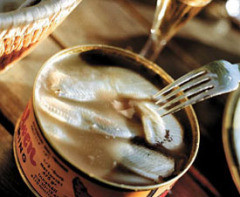 Delicacies of the worldSo, herring fins ordried ducks, sliced swallows and a swallow's nest boiled in broth, rotten eggs, which cannot be called rotten at all, because they are specially kept for a few months in a special solution consisting of salt, lime and wood ash - all this is purely national Chinese dishes which we do not have. And in China, these dishes are not eaten so often, at least not on weekdays. Snakes, swallow nests? A matter of taste and habit. The Chinese do not like our cheese and butter. They call them spoiled milk. Many have seen on the shelves of supermarkets and even tried Roquefort cheese, covered with green mold, but not everyone has heard about the Swedish national dish “surstreming”. According to its taste, this dish can claim high places in the rating of delicacies, and by smell it can be compared only with the Chinese dish - rotten eggs and the royal fruit durian. As a rule, nobody deliberately devises such kind of delicacies as surrestrumming. by chance, and the case is still quite unusual. In the 16th century, Sweden waged a war of naval supremacy with the German city of Lübeck, whose fleet at that time was superior to the Swedish fleet, and this created many problems for the Swedes, it was very difficult for them to bring cargoes into Sweden by sea routes that were necessary to maintain the army’s combat effectiveness. including salt, which was used for preservation - the main dish in the Swedish army - was quickly depleted. Some of the suppliers in order to save the deficient preservative began not to report the salt in the kegs of fish. As a result of such a scam, the fish was poorly preserved and began to smell unpleasantly - it was simply rotten. Under normal conditions, it would probably have been thrown away, but, as legend has it, then, during the acute shortage of food, it was not necessary to choose, and herring was given to the soldiers who, to everyone's surprise, gladly ate her. As it turned out, it didn’t taste like a rotten fish at all, but someone even tasted its sour taste. The fish is not rotten, but "soured". There was a rumor about the new unusual Swedish dish, and since salt was expensive at the time, even in peacetime, in Northern Sweden, where it was not easy to get fresh food, the fermentation of herring became a common method of its preservation. So, according to legend , the origin of the Swedish national dish. Ever since, the Swedes cherish their special culinary heritage. Not everyone believes this legend. According to some scientists, fish was preserved by the “fermentation” method long before the 16th century, both in Sweden and elsewhere in the Northern Hemisphere. Whatever the origin of superstropping, this fish always had a strong odor. But, despite the smell, today surstremming is served at banquets and is considered a delicacy. Now, however, few people eat this delicacy for lunch or dinner every day. On surstremming, rather, it is customary to invite guests. Fish has become popular throughout Sweden. This dish still remains a purely Swedish phenomenon. Few people outside the country have ever heard of surprise-ming, much less try. Therefore, foreigners who were invited to this delicacy and did not warn about its specifics, inevitably experienced shock at least twice. The first time they opened the can, and the smell spread. The guest, of course, logically concluded that the product had deteriorated and the owner, of course, would throw out the jar and offer something else. Then came the second shock, when the host and the guests began to eat fetid fish, and with great pleasure. In the 1930s, an attempt was made to introduce the Swedish dish to Americans. But when in New York, the customs officers opened a bank, they thought that they had undergone a gas attack. The product has been declared "unfit for consumption". However, the Swedes themselves are not unanimous in their attitude to the "fragrant" herring. This species of herring leaves no one indifferent. She is either adored or not tolerated. Anders Sparman, who in the middle of the seventeenth century was the court physician of Queen Christina Augusta, wrote that by the smell of surstreming it resembles fresh excrement. And the famous Swedish botanist of the XVIII century, Karl Linnae, on the contrary, sang the praises of this dish and even made some valuable recipes for its preparation. Abroad, the Swedes often say that they are most depressed for superstreme. For one time, successful attempts were made to get rid of the smell. But in this form, the superstreaming did not have commercial success, since, according to gourmets, a sudremming without smell is not a superstreaming. Real connoisseurs of everything directly from the bank. Sometimes they are seized with lingonberries and washed down with milk. But most often the fish is put on bread and butter, sprinkled with finely chopped onions, tomatoes and potatoes. It is preferable to use a surstreaming with cold beer or vodka. Surstrumming, served in this way, found quite a few fans who were once his staunch opponents. Recently, the Swedish aviation authorities decided to ban the sale of superstrums in the building of the capital’s Arlanda airport for fear that, if one such jar exploded on board an aircraft, some nerve passengers would think that victims of gas attack.
Delicacies of the worldSo, herring fins ordried ducks, sliced swallows and a swallow's nest boiled in broth, rotten eggs, which cannot be called rotten at all, because they are specially kept for a few months in a special solution consisting of salt, lime and wood ash - all this is purely national Chinese dishes which we do not have. And in China, these dishes are not eaten so often, at least not on weekdays. Snakes, swallow nests? A matter of taste and habit. The Chinese do not like our cheese and butter. They call them spoiled milk. Many have seen on the shelves of supermarkets and even tried Roquefort cheese, covered with green mold, but not everyone has heard about the Swedish national dish “surstreming”. According to its taste, this dish can claim high places in the rating of delicacies, and by smell it can be compared only with the Chinese dish - rotten eggs and the royal fruit durian. As a rule, nobody deliberately devises such kind of delicacies as surrestrumming. by chance, and the case is still quite unusual. In the 16th century, Sweden waged a war of naval supremacy with the German city of Lübeck, whose fleet at that time was superior to the Swedish fleet, and this created many problems for the Swedes, it was very difficult for them to bring cargoes into Sweden by sea routes that were necessary to maintain the army’s combat effectiveness. including salt, which was used for preservation - the main dish in the Swedish army - was quickly depleted. Some of the suppliers in order to save the deficient preservative began not to report the salt in the kegs of fish. As a result of such a scam, the fish was poorly preserved and began to smell unpleasantly - it was simply rotten. Under normal conditions, it would probably have been thrown away, but, as legend has it, then, during the acute shortage of food, it was not necessary to choose, and herring was given to the soldiers who, to everyone's surprise, gladly ate her. As it turned out, it didn’t taste like a rotten fish at all, but someone even tasted its sour taste. The fish is not rotten, but "soured". There was a rumor about the new unusual Swedish dish, and since salt was expensive at the time, even in peacetime, in Northern Sweden, where it was not easy to get fresh food, the fermentation of herring became a common method of its preservation. So, according to legend , the origin of the Swedish national dish. Ever since, the Swedes cherish their special culinary heritage. Not everyone believes this legend. According to some scientists, fish was preserved by the “fermentation” method long before the 16th century, both in Sweden and elsewhere in the Northern Hemisphere. Whatever the origin of superstropping, this fish always had a strong odor. But, despite the smell, today surstremming is served at banquets and is considered a delicacy. Now, however, few people eat this delicacy for lunch or dinner every day. On surstremming, rather, it is customary to invite guests. Fish has become popular throughout Sweden. This dish still remains a purely Swedish phenomenon. Few people outside the country have ever heard of surprise-ming, much less try. Therefore, foreigners who were invited to this delicacy and did not warn about its specifics, inevitably experienced shock at least twice. The first time they opened the can, and the smell spread. The guest, of course, logically concluded that the product had deteriorated and the owner, of course, would throw out the jar and offer something else. Then came the second shock, when the host and the guests began to eat fetid fish, and with great pleasure. In the 1930s, an attempt was made to introduce the Swedish dish to Americans. But when in New York, the customs officers opened a bank, they thought that they had undergone a gas attack. The product has been declared "unfit for consumption". However, the Swedes themselves are not unanimous in their attitude to the "fragrant" herring. This species of herring leaves no one indifferent. She is either adored or not tolerated. Anders Sparman, who in the middle of the seventeenth century was the court physician of Queen Christina Augusta, wrote that by the smell of surstreming it resembles fresh excrement. And the famous Swedish botanist of the XVIII century, Karl Linnae, on the contrary, sang the praises of this dish and even made some valuable recipes for its preparation. Abroad, the Swedes often say that they are most depressed for superstreme. For one time, successful attempts were made to get rid of the smell. But in this form, the superstreaming did not have commercial success, since, according to gourmets, a sudremming without smell is not a superstreaming. Real connoisseurs of everything directly from the bank. Sometimes they are seized with lingonberries and washed down with milk. But most often the fish is put on bread and butter, sprinkled with finely chopped onions, tomatoes and potatoes. It is preferable to use a surstreaming with cold beer or vodka. Surstrumming, served in this way, found quite a few fans who were once his staunch opponents. Recently, the Swedish aviation authorities decided to ban the sale of superstrums in the building of the capital’s Arlanda airport for fear that, if one such jar exploded on board an aircraft, some nerve passengers would think that victims of gas attack.

Making Money with Desserts: Success Stories
Evgeniya Polischuk (Fedutinova) instagram:@evgeniyafedutinovavk.com/janeshomebaking– It all started with baking for family and friends. Gradually, I started posting photos of my baked goods on Instagram – and orders started coming in. I made my first custom-made cake on October 13, 2014, and a little earlier I started making macaroons and cupcakes. You could say that the business “found me”, I am very […]

Soups are cold recipes with photos
Cold cucumber soup with yogurt and lemonsorbet from the chef of the restaurant La Taverna Alexander Zhurkin Photo: Getty Images Ingredients: Plain yoghurt – 125 g Cucumber – 150 g Lemon/lime sorbet – 50 g Cocktail shrimp – 24 g Fresh ginger juice – 1 g Lime juice – 5 g Fresh orange juice – 5 g Parsley – 1 g Pink pepper – 1 g Watercress – […]

barbeque kebab
Pork tenderloin in glaze Photo:Dmitry Bayrak/dbstudioPreparation time: 20 minutes + marinating time.Calories: 454 kcal per serving.For 4 servings: 4 pork tenderloins (approximately 300 g each), 1 onion, 2 cloves of garlic, 1 tsp. lemon zest, 1 tsp. lemon juice, a pinch of ground cumin, coriander and turmeric, 1 tbsp. vegetable […]

Pierre Duacan: dietary recipes: Ducane diet
Beetroot soup Photo:Season’S, Luxury Hotels RepresentationYou will need:· Boiled beetroot – 60 g· Fresh cucumbers – 20 g· Red radish – 20 g· Green onions – 10 g· Egg – 1 pc.· Drinking mineral water – 200 g· Salt – 1 gPreparation:· Boil the egg and beetroot.· Grate the cucumbers, radish and part of the beetroot. Put everything […]





